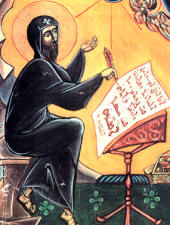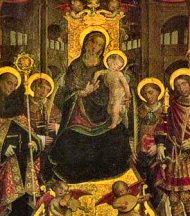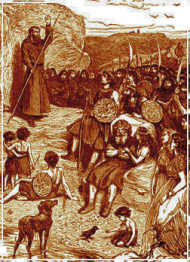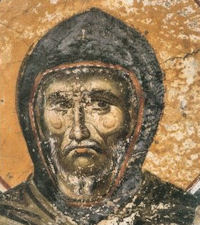Ordinary Time: June 9th
Tuesday of the Tenth Week of Ordinary Time; Optional Memorial of St. Ephrem, deacon and doctor
Other Commemorations: Sts. Primus and Felician, Martyrs (RM); St. Columba, Abbott (RM)
» Enjoy our Liturgical Seasons series of e-books!
St. Ephrem, called "the Harp of the Holy Spirit," is the great classic Doctor of the Syrian church. As deacon at Edessa, he vigorously combated the heresies of his time, and to do so more effectively wrote poems and hymns about the mysteries of Christ, the Blessed Virgin and the saints. He had a great devotion to Our Lady. He was a commentator on Scripture and a preacher as well as a poet, and has left a considerable number of works, which were translated into other Eastern languages as well as into Greek and Latin. He died in 373. Benedict XV proclaimed him a Doctor of the Church in 1920.
According to the 1962 Missal of St. John XXIII the Extraordinary Form of the Roman Rite, today is the feast of Sts. Primus and Felician as well as St. Columba. St. Ephrem's feast is celebrated on June 18.
Primus and Felician are two Roman martyrs of the via Nomentana. Their relics, transferred in the seventh century within the city, are at present in the church of St. Stephen on the Coelian Hill.
St. Columba, or Columkill, apostle of the Picts, was of illustrious Irish descent. He was brought up in the company of many saints at the school of St. Finian of Clonard. Being an ordained priest, and having founded many churches in Ireland, he went to Scotland with twelve companions, and there converted many of the northern Picts to the faith of Christ. He founded the monastery of Iona which became the nursery of saints and apostles. He also evangelized the northern English. He died on June 9, 597 at the foot of the altar at Iona while blessing his people, and was buried, like St. Brigid, beside St. Patrick at Downpatrick in Ulster.
St. Ephrem (also Ephraim)
Ephrem was of Syrian descent and son of a citizen of Nisibis. While yet a young man be betook himself to the holy bishop James, by whom he was baptized, and he soon made such progress in holiness and learning as to be appointed master in the school of Nisibis in Mesopotamia. After the death of the bishop James, Nisibis was captured by the Persians, and Ephrem went to Edessa, where he settled first among the monks in the mountains. Later, to avoid the company of those who flocked to him, he adopted the eremitical life. He was made deacon of the church of Edessa, but refused the priesthood out of humility. He was rich in all virtues and strove to acquire piety and religion by the following of true wisdom. He placed all his hope in God, despised all human and transitory things, and was ever filled with the earnest desire of those which are divine and eternal.
 He was led by the Spirit of God to Caesarea in Cappadocia, where he saw Basil, the mouthpiece of the Church, and they obtained benefit from their mutual intercourse. In order to refute the many errors which troubled the Church at that time, and to expound the mysteries of Jesus Christ, he wrote many books in the Syrian tongue, almost all of which have been translated into Greek. St. Jerome bears witness that he attained such fame that his writings were read publicly in the churches after the reading from the Holy Scriptures.
He was led by the Spirit of God to Caesarea in Cappadocia, where he saw Basil, the mouthpiece of the Church, and they obtained benefit from their mutual intercourse. In order to refute the many errors which troubled the Church at that time, and to expound the mysteries of Jesus Christ, he wrote many books in the Syrian tongue, almost all of which have been translated into Greek. St. Jerome bears witness that he attained such fame that his writings were read publicly in the churches after the reading from the Holy Scriptures.
On account of his works, so full of the light of heavenly doctrine, he was greatly honored even during his lifetime as a Doctor of the Church. He composed a poem in praise of the Blessed Virgin Mary and the saints for which he was called by the Syrians "the Harp of the Holy Ghost." He was noted for his great and tender devotion towards the immaculate Virgin. He died, rich in merits, at Edessa in Mesopotamia, on the fourteenth of the Kalends of July, in the reign of Valens. Pope Benedict XV, at the instance of many Cardinals of the Holy Roman Church, patriarchs, archbishops, bishops, abbots and religious communities, declared him by a decree of the Sacred Congregation of Rites to be a Doctor of the Universal Church.
—Excerpted from The Liturgical Year, Abbot Gueranger O.S.B.
Patronage: Spiritual directors; spiritual leaders
Symbols and Representation: deacon‘s vestments and thurible; vine and scroll
Often portrayed: In monastic habit; lying on a funeral slab; with a scroll and vine, as a deacon; hermit sitting on a column; man composing hymns with a lyre; man in a cave with a book; man with a cross on his brow, pointing upwards; man with Saint Basil the Great
Highlights and Things to Do:
- Read more about St. Ephrem:
- Read some of the writings of St. Ephrem.
- Read Pope Benedict XV's Encyclical Principi Apostolorum Petro on St. Ephrem and Pope Benedict XVI's General Audience on St. Ephrem.
- Catholic Culture has various writings, podcasts and collections of St. Ephrem:
- Church Fathers: Background on Heresies by Thomas Mirus
- Way of the Fathers: 28—Ephrem, Symbolist by Mike Aquilina
- Catholic Culture Audiobooks: St. Ephrem the Syrian—Hymns on Mary | Hymn Ten by James Majewski
- Catholic Culture Audiobooks: St. Ephrem the Syrian—Hymns on Faith | Hymn Ten: Fire and Spirit by James Majewski
- The Way of the Fathers: The Paradoxical Prestige of the Deacon in the Early Church by Mike Aquilina
- Way of the Fathers: Through Hymns, With Hymns, In Hymns: The Fathers & Music by Mike Aquilina
- Fathers of the Church collection under "Ephraim"
Sts. Primus and Felician
 At an advanced age the brothers Primus and Felician were beheaded at Nomentum (or Mentana). According to the legendary Acts of their martyrdom, they were thrown into prison by Diocletian. Felician was separated from his brother and subjected to cruel tortures. Then the magistrate called for Primus. "See," he said, "your brother has acted much more wisely than you; he listened to the emperor's wishes and now enjoys the greatest honor with him. If you follow his example, like consideration and favor will be shown you." Primus retorted: "What has happened to my brother, an angel has told me. Oh, that I, even as I am one in mind and heart with him, may not be separated from him in death!"
At an advanced age the brothers Primus and Felician were beheaded at Nomentum (or Mentana). According to the legendary Acts of their martyrdom, they were thrown into prison by Diocletian. Felician was separated from his brother and subjected to cruel tortures. Then the magistrate called for Primus. "See," he said, "your brother has acted much more wisely than you; he listened to the emperor's wishes and now enjoys the greatest honor with him. If you follow his example, like consideration and favor will be shown you." Primus retorted: "What has happened to my brother, an angel has told me. Oh, that I, even as I am one in mind and heart with him, may not be separated from him in death!"
Both were then thrown to the lions, but the beasts crouched at their feet, fawning with head and tail. Of the twelve thousand persons who witnessed this marvel, five hundred together with their families embraced the faith. Finally the two brothers were beheaded.
—Excerpted from The Church's Year of Grace, Pius Parsch
Symbols and Representation: As portrayed at their martyrdom: St Felician is nailed to a tree and St Primus is forced to swallow molten lead
Patronage: St. Primus: Bosa, Italy
Highlights and Things to Do:
- Read more about Sts. Primus and Felician:
- See the statue of St. Primus in St. Peter's Basilica Colonnade.
- See the statue of St. Felicianus in St. Peter's Basilica Colonnade.
- Their relics are located in Rome in Basilica of St. Stephen in the Round on the Caelian Hill (Italian: Basilica di Santo Stefano al Monte.
St. Columba of Iona, Abbot
 St. Columba is a saint who still, after fourteen hundred years, exerts an appeal upon our imaginations. Born in Ireland, in Donegal in the year 521, he was of the blood royal, and might indeed have become High King of Ireland had he not chosen to be a priest. His vital, vigorous personality has given rise to many legends, and it is a little hard to sift fact from what is more probably fiction. We do know that he was a man of tremendous energy, probably somewhat headstrong in his youth, but with his tendency to violence curbed by a gentle magnanimity.
St. Columba is a saint who still, after fourteen hundred years, exerts an appeal upon our imaginations. Born in Ireland, in Donegal in the year 521, he was of the blood royal, and might indeed have become High King of Ireland had he not chosen to be a priest. His vital, vigorous personality has given rise to many legends, and it is a little hard to sift fact from what is more probably fiction. We do know that he was a man of tremendous energy, probably somewhat headstrong in his youth, but with his tendency to violence curbed by a gentle magnanimity.
It seems certain that he left Ireland as an act of penance, although it is less certain how far this was connected with his quarreling over a copy of the Gospels he had made, a dispute that led to a bloody battle. He came from Ireland to Scotland, to the colony of Dalriada founded on the west coast by his fellow Irish Scots who were at that time somewhat oppressed by the dominant Picts. With twelve companions he founded his monastery on Iona in the year 563. These Celtic monks lived in communities of separate cells, but Columba and his companions combined their contemplative life with extraordinary missionary activity. Amongst his many accomplishments, Columba was a splendid sailor. He sailed far amongst the islands and traveled deep inland, making converts and founding little churches. In Ireland he had already, it is said, founded a hundred churches.
Of all the Celtic saints in Scotland, Columba's life is much the best documented, because manuscripts of his life, written by St Adamnan, one of his early successors as abbot of Iona, have survived. Iona itself remains a place of the greatest beauty, a serene island set in seas that take on brilliant colors in the sunshine, recalling the life and background of this remarkable man whose mission led to the conversion of Scotland and of the north of England, and indeed carried its influence far further afield. It later became the site of a Benedictine Abbey and of a little cathedral. These were dismantled by the Scottish reformers in 1561, and part of Columba's prophecy was fulfilled:
In Iona of my heart, Iona of my love,
Instead of monks' voices shall be lowing of cattle,
But ere the world come to an end
Iona shall be as it was.
When Dr Samuel Johnson visited the island in 1773 he observed, 'That man is little to be envied, whose patriotism would not gain force upon the plain of Marathon, or whose piety would not grow warmer among the ruins of Iona!'
Columba was a poet as well as a man of action. Some of his poems in both Latin and Gaelic have come down to us, and they reveal him as a man very sensitive to the beauty of his surroundings, as well as always, in St Adamnan's phrase, 'gladdened in his inmost heart by the joy of the Holy Spirit.' He died in the year 597.
—Courtesy of the Catholic Information Network
Patronage: against floods; bookbinders; poets; Ireland; Scotland; Scottish Highlanders; diocese of Argyll and The Isles, Scotland; diocese of Derry, Ireland; diocese of Dunkeld, Scotland; diocese of Pembroke, Ontario; diocese of Raphoe, Ireland; diocese of Youngstown, Ohio; city of Derry, Ireland; city of Pemboke, Ontario, Canada
Symbols and Representation: Coracle; white horse; Celtic cross; devils fleeing; Monk's robes; Celtic tonsure and crosier
Highlights and Things to Do:
- Read a longer life of St. Columba or read St. Adamnan's life of St. Columba.
- Read more about St. Columba:
- See Catholic Cuisine for simple ideas for his feast.
- In traditional lore, in Scotland on June 9, the feast of St. Columba is one of the luckiest days of the year when it falls on Thursday. The saying goes:
Day of Colum Cille the beloved
Day to put the loom to use
Day to put sheep to pasture
Day to put coracle on the seas
Day to bear, day to die
Day to make prayer efficacious
Day of my beloved, the Thursday. (Carmina Gadelica) - The healing herb, St. John's Wort, which flowers around the Summer Solstice, is his herb.
- In Norway, this is considered the day the salmon start leaping.



